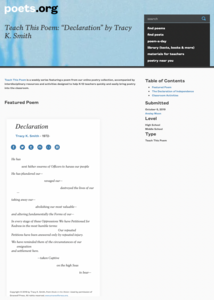National Endowment for the Humanities
The Glass Menagerie: Key Themes
Using the list of expressionist techniques generated in the first lesson, groups analyze how Williams uses these techniques to develop one of the play's themes. The whole class then shares and discusses the examples they found where...
National Endowment for the Humanities
The Glass Menagerie as Expressionist Theatre
The first lesson in a three-part unit has high schoolers examine The Glass Menagerie as an example of expressionist theatre. After reading a short article about expressionism, scholars list expressionist techniques in Tennessee Williams'...
National Endowment for the Humanities
Societal Schisms and Divisions
The final lesson in the Crime and Punishment unit looks at the societal injustices depicted in Dostoyevsky's novel. Scholars examine the schisms between men and women, between wealth and poverty, between religion and skepticism, and...
Newseum
Quick Skim or Deep Dive? Picking the Right Search Strategy
To search online to find answers to some questions requires only a quick skim, while others demand deep research. Scholars engage in a lesson that teaches them the difference and how to craft questions that produce the best online search...
National Endowment for the Humanities
Man and Superman
Ordinary and extraordinary readers will find much to contemplate in a instructional activity on Crime and Punishment as they examine the dichotomies in Dostoevsky's novel. Scholars reflect on Raskolnikov's theory that extraordinary...
National Endowment for the Humanities
Dostoevsky's Crime and Punishment
Pain and suffering do not have to be inevitable in a study of Crime and Punishment. A carefully scaffolded lesson introduces readers to the divided natures of the characters in Fyodor Dostoevsky's complex novel. Groups use the provided...
National Endowment for the Humanities
Literary Genres in “Moby-Dick”
Moby Dick is more than a whale of a tale narrated by Ishmael. A lesson studying Herman Melville's classic novel asks readers to examine the different genres the author weaves into his story. Instructors model how to conduct a stylistic...
National Endowment for the Humanities
Dramatic Perspective in Moby Dick
A lesson on Herman Melville's Moby Dick asks readers to compare the first person point of view of Ishmael in Chapter 1 to Captain Ahab's dramatic monologue in Chapter 37. Readers cite evidence from the chapters to support their analysis...
National Endowment for the Humanities
Narrative Voice in Moby Dick
Call him a reliable narrator! Ishmael is the focus of a lesson that asks readers to analyze the complex character of Herman Melville's narrator as he is introduced in the first chapter of Moby Dick.
National Endowment for the Humanities
Themes in Lord of the Flies
William Golding's Lord of the Flies is the anchor text for a lesson that teaches readers how to distinguish between a literary topic and a literary theme. Using the provided worksheets, groups first chart some themes and propose a...
National Endowment for the Humanities
Characterization in Lord of the Flies
Readers of Lord of the Flies hunt down direct and indirect examples of how William Golding brings his characters to life. After instructors guide learners through the process of collecting evidence of these two types of characterization...
National Endowment for the Humanities
Symbolism in Lord of the Flies
Readers of Lord of the Flies examine the four main symbols William Golding develops in his novel: the island, the conch, the Lord of the Flies effigy, and fire. Partners select one of the major symbols and create an image by adding words...
National Endowment for the Humanities
Toni Morrison's Beloved: For Sixty Million and More
Complex, disturbing, and challenging, Beloved is the focus of a lesson that provides three activities to guide a close reading of Toni Morrison's novel. Readers create chapter titles based on key plot elements or themes, identify...
Learning for Justice
Marian Wright Edelman
Marian Wright Edelman's 2014 Commencement Speech at Lewis and Clark College serves to inspire young scholars to investigate a problem in their community, to determine why the problem is important, and then to develop a plan for one thing...
Learning for Justice
Mary McLeod Bethune
Young historians conduct a close reading of the text of an interview with Mary McLeod Bethune, the daughter of former slaves who taught herself to read, grew up to establish schools for other Black women, and went on to become an advisor...
Newseum
Is It Fair?
Young journalists learn how to analyze word choice, context, and counterpoints to judge the fairness of a news story. They practice using these tools to judge a series of headlines for the story of Goldilocks and the Three Bears. They...
Learning for Justice
Mary Church Terrell
Excerpts from an 1898 speech by civil rights activist Mary Church Terrell offers young scholars an opportunity to investigate how Black American women fought for civil rights long before Rosa Parks and the civil rights movement of the...
Learning for Justice
Maya Angelou
Maya Angelou's poem, "Still I Rise", offers young scholars an opportunity to consider how poets use literary devices to create powerful messages. After a close reading and discussion of the poem, class members reflect on how they can...
K20 LEARN
Hooking Your Reader
Hook your class into inquiry-based, hands-on learning with a activity on narrative leads. Pupils research different types of hooks and decide which one to use in their own writing. Carefully scaffolded to include all learners, the...
Academy of American Poets
Teach This Poem: "A New National Anthem" by Ada Limón
Ada Limon's poem, "A New National Anthem," offers young scholars an opportunity to reflect on the significance of the US national anthem and the extent to which Key's vision applies to all Americans. After watching a video of Whitney...
Academy of American Poets
Teach This Poem: “Declaration” by Tracy K. Smith
Tracy K. Smith's erasure poem "Declaration" challenges scholars to use their noticing skills to make connections between an engraving entitled "The Declaration of Independence" and Smith's poem. Class members record observations and...
Academy of American Poets
Teach This Poem: "A Place in the Country" by Toi Derricotte
Build young scholars' confidence in analyzing art and poetry with a lesson plan that first asks pupils to list details they notice in Edouard Vuillard's painting "Garden at Vaucresson" and then to describe how the painting makes them...
Academy of American Poets
Teach This Poem: "Imagine" by Kamilah Aisha Moon
A lesson about Kamilah Aisha Moon's poem "Imagine" asks young scholars to imagine, "What would happen if...?" If Dr. Martin Luther King's dream became a reality. If Renisha McBride was a white girl and crashed her car in a black...
Academy of American Poets
Teach This Poem: "Old South Meeting House" by January Gill O'Neil
The vaulted ceiling of the Old South Meeting House has heard many voices. Young scholars read an excerpt about its importance in American history and then do a close reading January Gill O'Neil's poem, "Old South Meeting House." After...

























